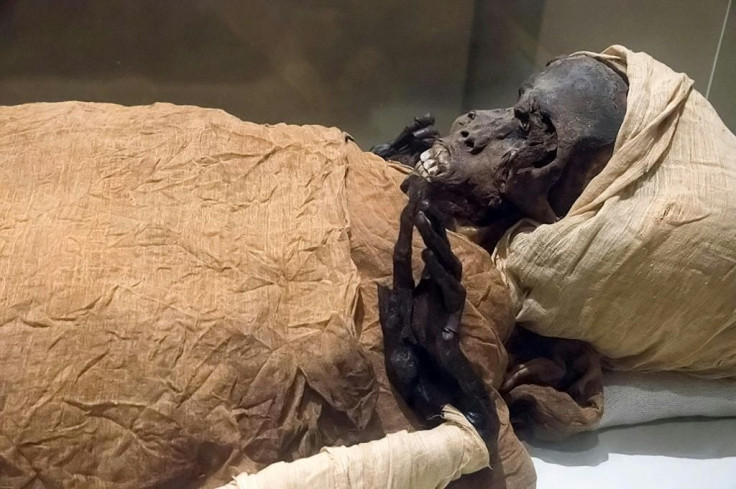Mummies With Golden Tongues Found In Ancient Cemetery; What Could It Signify [Photos]
KEY POINTS
- They were discovered at the Quweisna necropolis in Egypt
- It was believed the gold would help the dead people please Lord Osiris
- The site reportedly belonged to the Ptolemaic and Roman periods
Archaeologists have found several mummies with golden tongues in their mouths at an ancient Egyptian necropolis. Experts think the gesture was meant to please the god of the underworld.
The mummies were discovered at the Quweisna (also called Quesna) necropolis in the central Nile Delta, Egypt's Ministry of Tourism And Antiquity shared on a Facebook post.
The site, discovered in 1989, reportedly belonged to the Ptolemaic and Roman periods, which was between 300 BCE and 640 CE.
Experts believe that a golden tongue was necessary to please Osiris.https://t.co/K3mu3vFNjR
— Interesting Engineering (@IntEngineering) November 28, 2022
The first golden-tongued mummy was discovered at the start of 2021, according to ScienceAlert. By the end of the year, three more mummies of a child, a man and a woman were found at the same site. All of them had golden tongues.
#Archaeologists in #Egypt have found a number of ancient mummies whose tongues had been removed and replaced with golden tongues! It is believed the gold tongues were given to #mummies so that they could speak to the judge of the dead https://t.co/O38pfY4iSl pic.twitter.com/IZksch3HRo
— Ancient Origins (@ancientorigins) November 27, 2022
Experts said gold was used in place of tongues by embalmers to ensure the dead would find it easier in the afterlife. The golden tongue was thought to help dead people get in the good books of Osiris, the lord and judge of the underworld.
Osiris despised noise and ensured silence in the underworld, according to ancient beliefs. Fittingly, the underworld in ancient Egypt was also called the Silent Land, and Osiris was called the Lord of Silence. The funerary arrangements in ancient Egypt were carried out in silence for this very reason.
Osiris was the oldest offspring of Geb, the Earth god, and Nut, the sky goddess. He fell in love with his sister Isis, the goddess of motherhood, magic, fertility, death, healing and rebirth, in the womb, according to Interesting Engineeering. She later became his wife. Envious of Osiris, his brother Seth, murdered him and scattered the body parts over Egypt. Following Osiris' death, Seth became the king of Egypt.
Gold was a popular commodity in ancient Egypt. It was believed to be the skin flesh of the Sun God, Ra. The shiny metal was also associated with eternity.
However, there is no conclusive proof to establish why gold is used in the tongues of mummies.
Archaeologists also warn the mummies found at the Quweisna necropolis are in bad condition and might not survive without proper preservation.
Speaking of mummies, a strange phenomenon is baffling scientists in Portugal. Corpses at local graveyards are naturally turning into mummies.
"It's quite astonishing," said Silva Bessa, a forensic anthropologist. "In the same section of the cemetery, I have different stages of decomposition. Even on the same body, I might have all the body skeletonized, the pelvis area in putrefaction, and the hands mummified. So, you can find a little bit of everything."

© Copyright IBTimes 2025. All rights reserved.




















